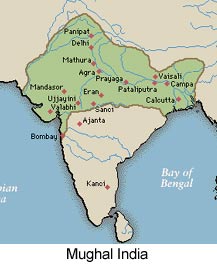

 |  |
 Akbar's conquests subdued the powerful Rajput princes, particularly after his army captured the apparently impregnable fortress of Chitor in 1567, using mines and artillery. Akbar's reorganization of the army gave the Mughal Empire in India a permanent, powerful instrument of control. But his finest achievement was the organization of a system of land taxation. This was administered by his able Hindu minister, Raja Todar Mal (the process was named bandobast).
Akbar's conquests subdued the powerful Rajput princes, particularly after his army captured the apparently impregnable fortress of Chitor in 1567, using mines and artillery. Akbar's reorganization of the army gave the Mughal Empire in India a permanent, powerful instrument of control. But his finest achievement was the organization of a system of land taxation. This was administered by his able Hindu minister, Raja Todar Mal (the process was named bandobast).
The wealth of the Indian princes and Indian states had always depended on taxing crops grown by peasant farmers. Agriculture was highly productive. Many areas grew two, or even three, crops a year. These included crops such as wheat, barley, and millet, as well as rice, cotton, and sugar cane, which needed a considerable quantity of water. Akbar and his finance ministers decided to reorganize the land taxation system and link it to the administration of the empire. This was done in two ways. Firstly, Akbar's officials made a detailed land survey to measure how much land was under cultivation, its fertility, and the kinds of crops grown. Standard rates of taxation were then imposed. The peasants cultivating the fields knew exactly how much their taxes were, and when they had to pay. Secondly, Akbar started a new administrative system known as jagirdari. A military or civil officer in charge of a district was given a certain quantity of land for a limited period, instead of being paid a salary from the central treasury. A military officer was also expected to keep a certain number of cavalry soldiers, and he had to pay for these soldiers out of his jagir, or land grant. These units of cavalry made up the Mughal standing army. The holders of the jagir were moved from place to place every two to three years so that they did not become local landowners, with selfish interests. The success of the system depended on the accuracy of the land survey, and the calculation of the value of the agricultural production of each village. In addition, Akbar's officials divided the empire into provinces and districts. A military officer, often a prince belonging to the royal house, acted as the viceroy (governor) of the provinces. A separate official, called the dewan, collected taxes, and sent the money to the central treasury in Delhi. The economic prosperity of Mughal India was greatly helped by these reforms, and there was a big expansion of trade. New towns and cities were built, and the production of basic goods such as cotton cloth increased. There was no elaborate system of judicial courts such as the British later introduced. Criminal cases in the towns were dealt with by government-appointed Muslim qazis or law officers administering the Muslim code. In the countryside, government courts only existed at the district headquarters or other small towns; the imperial officer were only concerned with large scale crime such as gang robbery. Order was maintained in the villages largely by the village elders themselves. Thus the villager saw the government mainly in the guise of a revenue-collecting agent, as a judge in a dispute, or as an army which plundered him. next page >> |
Copyright ©2000 indiansaga.info. All rights reserved.
By using this service, you accept that you won't copy or use the data given in this website for any commercial purpose.
The material on indiansaga.info is for informational & educational purpose only.
This site is best viewed at 800 X 600 picture resolution.